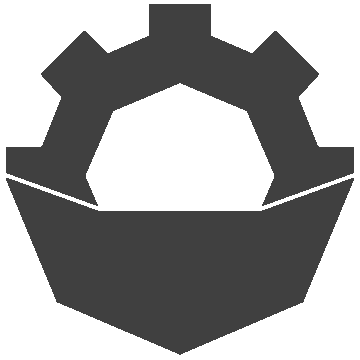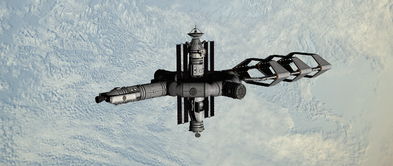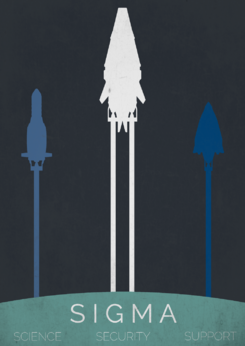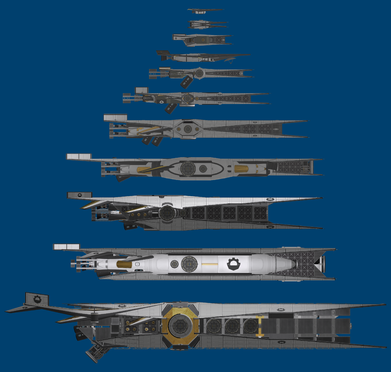Sigma Technical
|
Sigma Technical
|
|||||
|---|---|---|---|---|---|
 |
|||||
| Industry | Orbital Manufacturing | ||||
| Location | |||||
| Headquaters | Phoezia | ||||
| Area Served | Global | ||||
| Subsidiaries | Abyssal Shipyard Exports | ||||

Sigma Technical is a private orbital shipbuilding company with cliental in Tekkia, The Kalbans, and Grestin. It was founded as a breakaway of exisiting Probode-Teknik in the early 1990s. The company is known for their robust designs, modularity, and signature shape. Sigma Technical is also hired to carry out routine maintainence on Traie Station around Ike.
History
Sigma Industrial
Prior to acquisition SI maintains a small fleet of its own. These ships were more focused on movement than offence and so often became a favorite of privateers. The company is based in Lar province and began business as a munitions manufacturer during the Second Krakenary war, the company began shifting to orbital defence during the early years of commercial spaceflight. In the leadup to the company's crash Sigma Industrial continued to gain most of its income from the defence of other groups but had minor mining operations in the asteroid belt, accounting for 13% of its annual profits.
Probe-Tek
Probe-teK is a joining of two companies Probode inc & KiloWhiskey Technologies. Both companies specialize in technology and ship production. Early ships were mostly failures and after a utility ship incident engineers saw an opportunity for a safer way to do things. By remotely controlling the ships casualties were kept to a bare minimum. Only ever recording 3 crew deaths prior to re-instating crewed ships. The first ships were liquidated stock from others but eventually the first home built, ship the Bayonet came to light. It was slow, manned, heavy, and very sluggish. Over time refinement resulted in a ship that was second to none, popularity surged and the fleetline was expanded to include everything from the lightest production fighters to the heaviest production carriers. Over time Probe-teK became a trusted name in spacecraft production, giving it's name to even HKA efforts. But as time passed decades old techniques began to show their wear on the tried ships, ships struggled to keep up with newer names and the company began to experience losses both monetary and physical. A new generation of ships for a new battlefield was needed.
Merger/The Wilson Program
The Wilson program began in the early 1990s as a short test of the effectiveness of combat ships in live future environments. Growing from one large dreadnought to a prototype fleet of designs in a matter of months a need was seen to revise the design and pursue this concept further. These ships of the 3rd generation were the first to be dubbed SIC as to differentiate them from the still ongoing PTV line and Sigma Industrial was bought outto facilitate their design as a subsidiary of Probe-Tek. In late these new discoveries called for changes to be made to the line. It became quickly clear that the range of ships in the line would be greatly hindered by having to fit into cargo bay profiles, as an outcome the existing designs were retrofitted with fully winged hulls as well as a number of other improvements. Though only one design of the 4th generation would be carried through it would become the basis of the whole line carrying on.
Under Sigma Industrial had grown in popularity with private firms and national governments alike, pushing the company to almost outgrow it's parent. At this time the Broadsword design would be brought in and modified to serve in the line and would also serve as a basis for other ships. The 5th generation ships would prove to be as capable a combatant in modern ship warfare as it's sister line, pushing the decision to discontinue any additions to the PTV line and focus attention on SI's developments.
A number of factors gave way to the creation of the 6th generation, attempts at minimizing heat generation, visible profile, and durability in order to gain business from companies attempting to work below the radar of many defence agencies... The 6th generation became little more than a bridge between the 5th and 7th due to little cohesiveness, poor sales, and many experimental concepts. The seventh generation Features a complete fleet overhaul, plate under-armor for heavy combat ships, crew escape pods, as well as more efficient part and fund management at the cost of range at a 20% reduction and twr at a 15% reduction. The 7th generation was built for war. The 7th generation is also the first to hold the STV designation as a notice of the line now serving as the only line of the newly merged companies. Due to the complex logistical requirements of each ship Gen 8 began a focus on higher build quality and greater standardization and saw the eventual retirement of the Broadsword ending in 2067.
Units produced by STV
Military 2090 - 2145
- Heavy Capital
- Akmah III Class - Supercarrier
- Aonta II Class - Titan
- Cath IV Class - Dreadnought
- Deadle II Class - Heavy Carrier
- Main Capital
- Mara I Class - Light Carrier
- Fege I Class - Cruiser
- Semai I Class - Heavy Destroyer
- Sola II Class - Destroyer
- Graner I Class - Frigate
- Ketan V Class - Corvette
- Sub-Capital
- Pike I Class - Heavy Fighter
- Tak III Class - Medium Fighter
- Trepo II Class - Light Fighter
Civillian 2090 - 2145
- Sto I Class - Lander
- Lastas V Class - Shuttle
- Colona III Class - Colony Ship
- Aricibo III Class - Exploratory Ship
- Mianach IV Class - Mining Lander
- Sabri I Class - Frieghter
Other Units Produced
- Vanguard II Class - Battlecruiser
- Sabre VI Class - Exofighter
- Bayonet I Class - Destroyer

